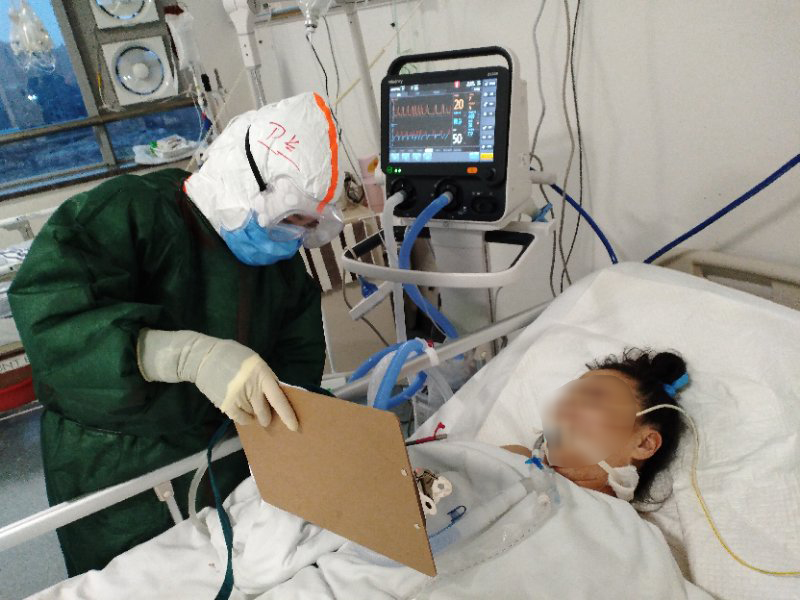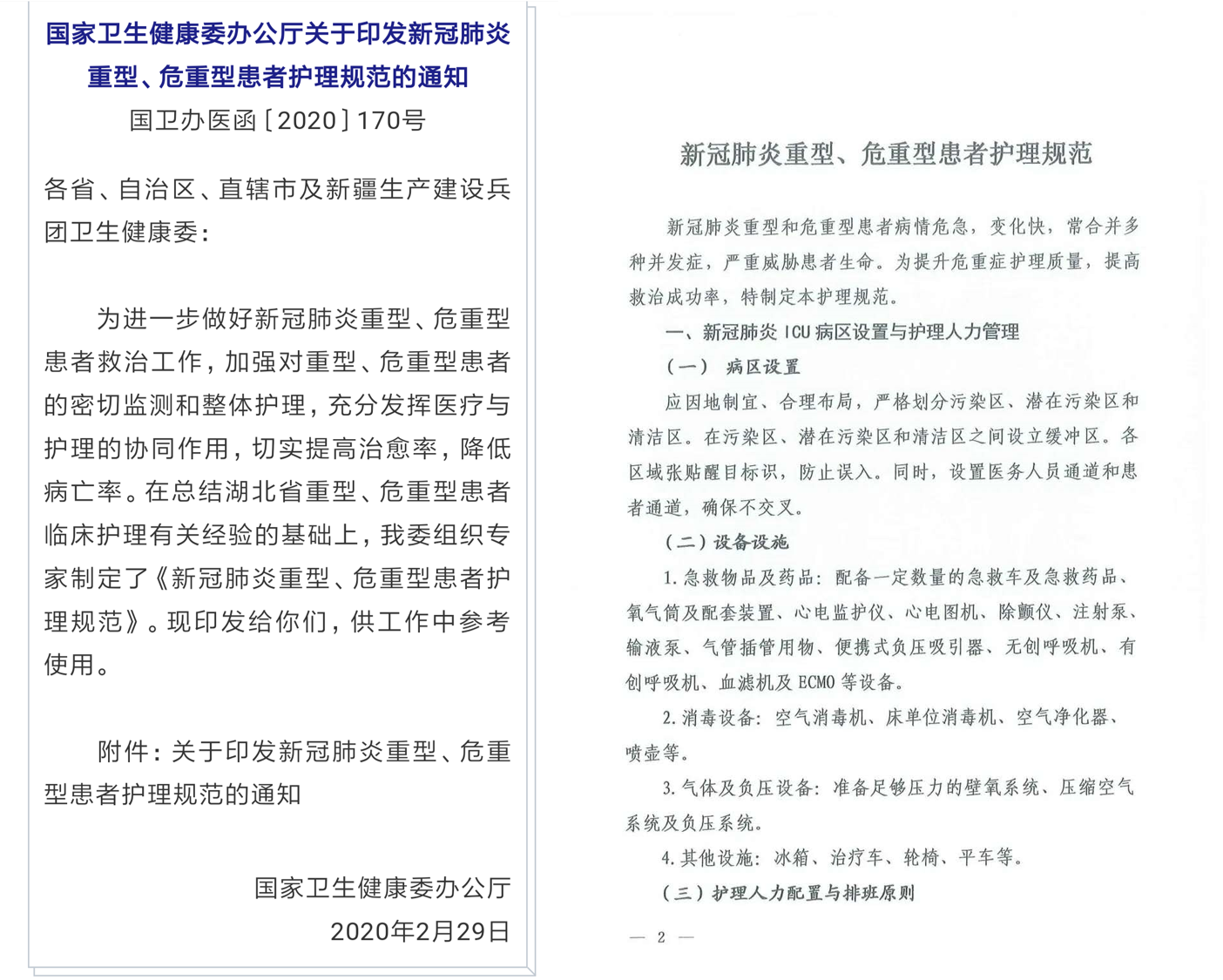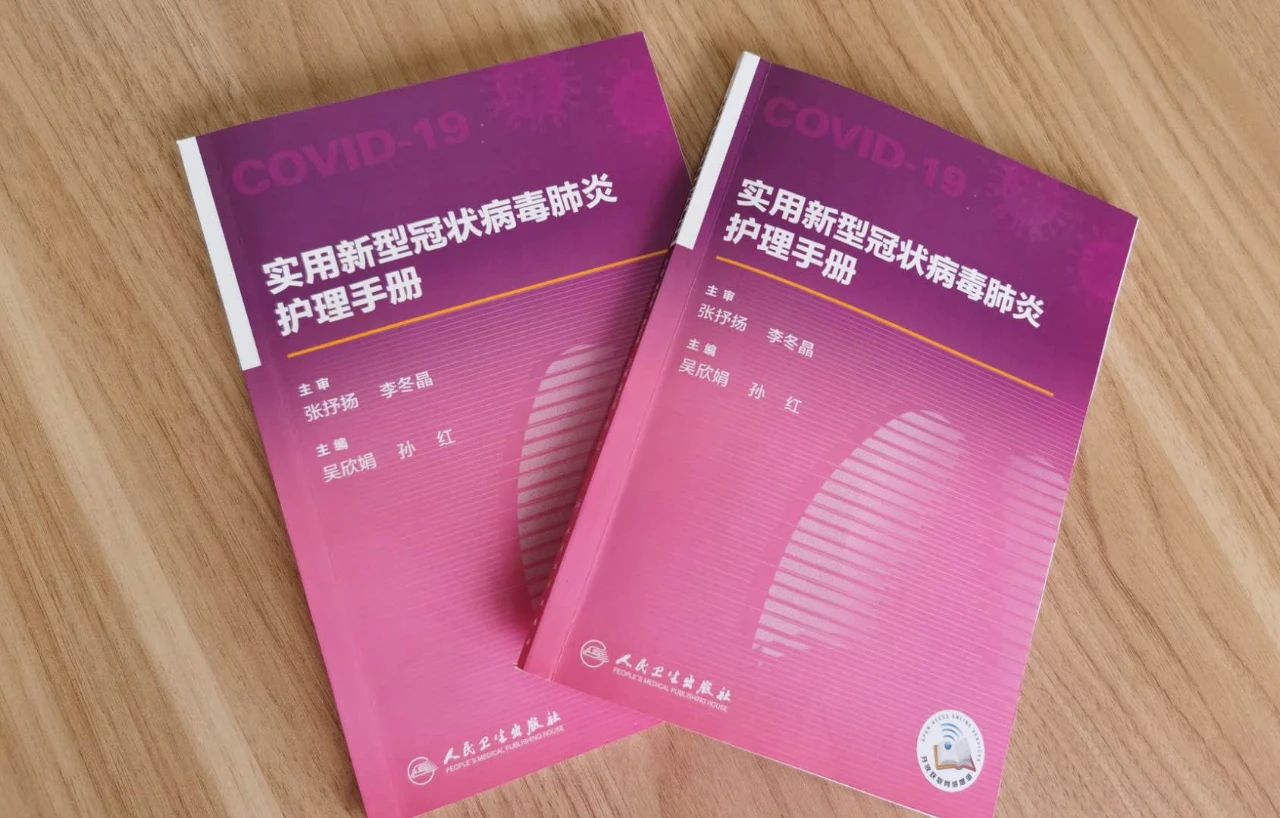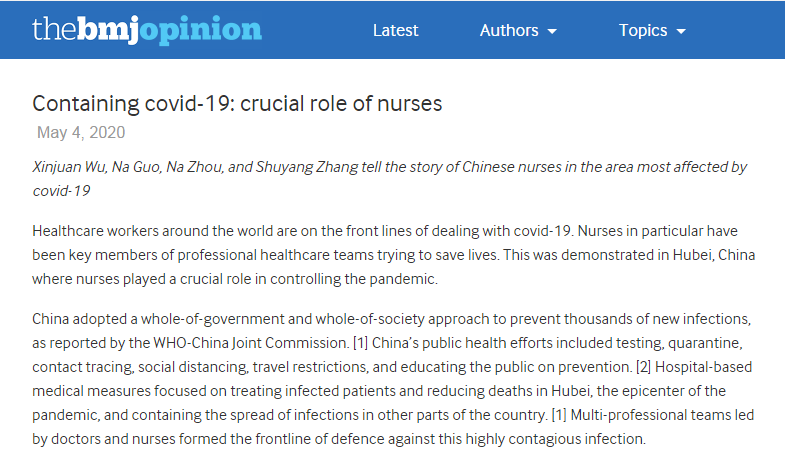International Nurses Day is celebrated every year on May 12 in memory of Florence Nightingale, the founder of modern nursing. On this special day, Prof. Wu Xinjuan, Florence Nightingale Medal awardee in 2011, President of the Chinese Nursing Association, co-leader of Peking Union Medical College Hospital (PUMCH) second batch of National Medical Aid Team to Wuhan, and the director of the Nursing Department of PUMCH, recalled the arduous days and nights she spent in Wuhan with her teammates in fighting against the pandemic. After the COVID-19 spread in Wuhan, China, PUMCH sent 186 medics to Wuhan in four batches to tackle the most challenging cases. Notably, there were 135 nurses, accounting for 72.6% of the 186-member team, with an average age of 33.1 years. Among them there were 22 head nurses and clinical nursing instructors, and 39 clinical nursing specialists. It was a young but hardcore team. Under the leadership of PUMCH and guided by the spirit of PUMCH nursing, the team won the fight against the pandemic.

▲ A group photo of 186 members of the PUMCH National Medical Aid Team to Hubei at Tongji Hospital’s Sino-French New City Branch
On February 7, 2020, I was privileged to join the second batch of PUMCH National Medical Aid Team to Wuhan and worked with our colleagues in the epidemic center in Hubei Province to fight against the COVID-19 outbreak. This arduous defense battle received full support from the hospital. As instructed by Dr. Zhao Yupei, President of PUMCH, all the team members struggled to achieve two goals: "save the patients’ life successfully" and "protect every medic from being infected”. Without any fear of all forms of risks and challenges, our team submitted a satisfactory answer to the Party and the Chinese people. I have served as a nurse in PUMCH for 39 years, and I was highly proud of being a member of the anti-coronavirus team. During these tough days and nights in Wuhan, I witnessed the inheritance of the glorious PUMCH nursing spirit among the young generation.
Fight difficulties with upward optimism
The sudden COVID-19 outbreak in Wuhan early in 2020 caused significant disruptions in daily living. The same was true for medical staff. They had to face challenges including the newly-emerged highly infectious disease, the newly-formed medical teams, the urgently-reconstructed isolation wards, and the unfamiliar working environments, work flow, and facilities and equipment. However, all the PUMCH nurses did not flinch and confronted these bravely.
On January 26 (the second day of Chinese Lunar New Year), the first batch of PUMCH nurses arrived in Hubei Province. Under the leadership of Dr. Han Ding, Vice President of PUMCH, they worked together with other team members to re-build the ordinary wards into dedicated isolation wards for critically ill COVID-19 patients within 48 hours, paving a solid foundation for the combat against the coronavirus.
In the face of complicated work processes, the head nurses and nursing backbones immediately participated in the development of detailed procedures and protocols, which were displayed in a concise and simple flowchart to facilitate nurses to remember and implement. In more than 2 months, 8 work processes, 4 nursing checklists, and over 60 clinical reminders for nurses were developed and applied, ensuring each shift to offer the homogeneous nursing service to each patient. Meanwhile, under the leadership of Prof. Zhang Shuyang, the Party Secretary of PUMCH, we formulated the Administrative Measures on the Health Protection of Staff Members in the Centralized Residential Zones only two days after arriving in Wuhan, which laid a good foundation for achieving the target of “zero infection among the team members”.
Most patients in the wards had to undergo tracheal intubation or tracheotomy. Since the nurses had the closest and longest contact with the patients, they faced a high risk of infection and were often physically exhausted. "I have practiced to wear and take off PPE frequently during the skill assessments; however, I have never expected to wear thick protective clothing for hours of high-intensity work.” A nurse wrote in her diary. “Every time when I take off my mask and goggles after work, there is a feeling of surfacing from the sea floor.” Some nurses experienced nausea, dizziness, and hypoxia after wearing the heavy PPEs. However, none of them withdrew. After taking a short break in the semi-contaminated area, they would come back to the bedside. Their clothes were always soaked in sweat during work. The rashes on their skin and the indentations on their faces tugged at my heartstrings. Whenever I asked if there was any difficulty, they always replied cheerfully, "We are fine. Don’t worry!"
I know that some of them were not physically strong, and many of them had young children and old parents at home. It's natural that they were deeply concerned about their families during such a pandemic. However, all of our nurses kept optimistic and fearless.
Respect life with passion and love
The COVID-19 pandemic brought tremendous psychological impact on the patients and their families. They need respect, care, and encouragement. Especially in ICU, doctors and nurses were the patients’ most trusted persons. For conscious patients, nurses always took the initiative to communicate with them. For instance, they encouraged the patients to meet with their families through WeChat videos and bought tablets to let the patients write down their needs and feelings. For coma patients who could neither hear nor see, the nurses still communicated with them by holding their hands during ward rounds or when performing procedures. When some patients passed away, the nurses carefully wiped their bodies with a warm towel, bowed to greet the dead, and cautiously stored their possessions. As always, the nursing staff from PUMCH showed their heartfelt respect and love to their patients and to their career.

▲ A nurse communicates with a critically ill patient by writing

▲ Trimming nails for a patient
In this tough battle, comprehensive, refined, and high-quality nursing is the key to increasing the cure rate and lowering the case-fatality rate. Although the nurses were at a high risk of being infected despite wearing PPEs, the standard of PUMCH nursing was never compromised. With their solid basic skills, PUMCH nurses offered precise and tailored nursing for each patient after careful observation and analysis. Working closely with the doctors, the nurses saved numerous lives. With their solid professional knowledge and skills, the specialist nurses from multiple specialty departments including critical care medicine, respiratory medicine, and hemodialysis, etc. played a pivotal role in saving patients' lives and reducing complications.
In the battle with the coronavirus, nurses often rejoiced for several days for a thumbs-up got from the patients with their trembling hands; also, they were particularly happy for patients who were successfully extubated and transferred out of the ICU. "You are true angels and you give me confidence and hope again. Although I can't see your face, I will always remember the angels in white from PUMCH! Thank you very much.” Said Mr. Li, a 23-year-old patient, when he was transferred out of the ICU. I think this was not just the adequate recognition of the nurses’ efforts but also a power of love!
Win the battle with learning and sharing
Our knowledge and experience were quite limited when this brand new virus occurred. PUMCH nurses studied hard to be well prepared for the management of COVID-19. As long as they were not on duty, the nurses would use the evening time to participate in the COVID-19 workshops organized by the medical aid team, and many of the nursing backbones also become lecturers in these training sessions. They kept observing and thinking during their work. For example, some nurses found that there was a big safety concern when pouring the condensate from the ventilator pipeline, and they managed to improve the condensate collection device. A relevant patent has been filed. During the 80 days of aid to Wuhan, the nurses spent much of their time discussing new problems and new discoveries in their work, even when on the shuttles or in the dormitory. Their professional abilities and skills were remarkably improved during the pandemic. “Serving on the front line gave us a unique training experience, and we will be able to care any critically ill patients in the future,” some nurses said. I am really proud of our young generation. The future of PUMCH nursing is promising!
The nurses were well aware that, as a national team in medical care, PUMCH should serve as a leader in the batter field. In these busy days and nights, the nursing staff, both on the front line and on the home front, work closely and quickly summarize the work experience in fighting against COVID-19. Based on our previous knowledge and the practice in the front line, we developed the Nursing Criteria for Patients with Severe and Critical COVID-19, which has become the main content of the relevant nursing guidelines released by the National Health Commission. In early March, we published Practical Manual of Nursing Care for COVID-19 Patients and immediately sent 35,000 copies to 31 provinces, municipalities, and autonomous regions, as “a precious gift" for our nursing colleagues; application for translating this manual into other languages has been received. We also shared our experience in combating COVID-19 to global peers via the webinars hold by the International Council of Nurses and published a scientific article in the British Medical Journal (BMJ), with an attempt that the whole world can benefit from PUMCH wisdom and experience.

▲ Based on our previous knowledge and the practice in the front line, we developed the Nursing Criteria for Patients with Severe and Critical COVID-19

▲the Practical Manual of Nursing Care for COVID-19 Patients

▲ A scientific article summarizing frontline experience published in the British Medical Journal
The year 2020 has been designated by the World Health Organization as the Year of the Nurse and the Midwife, and it also coincides with the 200th anniversary of the birth of Florence Nightingale, who is recognized as the founder of modern nursing. In my opinion, the outstanding performance of PUMCH nurses in the fight against COVID-19 is not only the best demonstration of the PUMCH nursing spirit but also the best gift for Nightingale’s 200th birthday! Thank you all who have fought hard on the front line, and thank all the lovely and respectable PUMCH nurses! As this extraordinary International Nurses Day is coming, I wish you all a very happy holiday!
